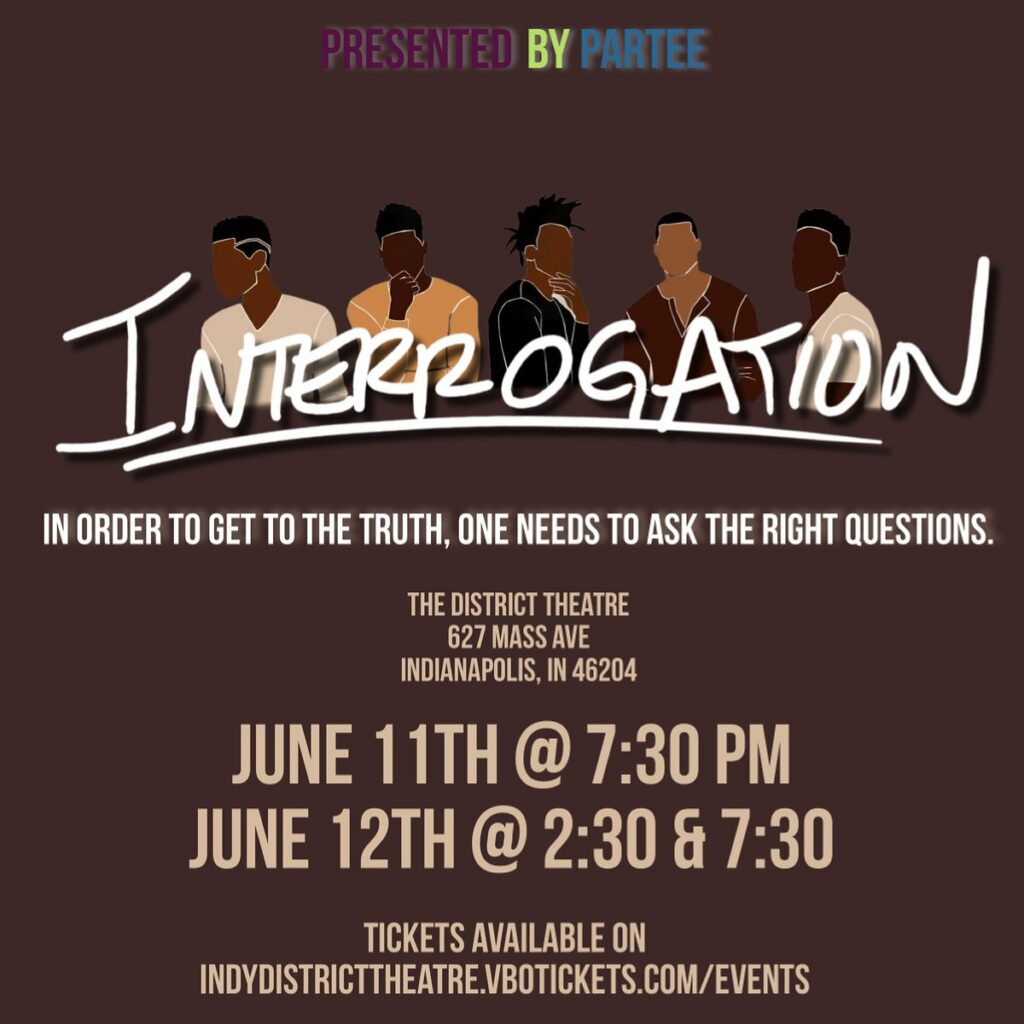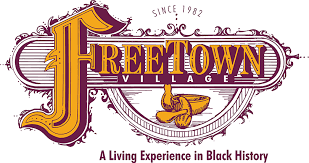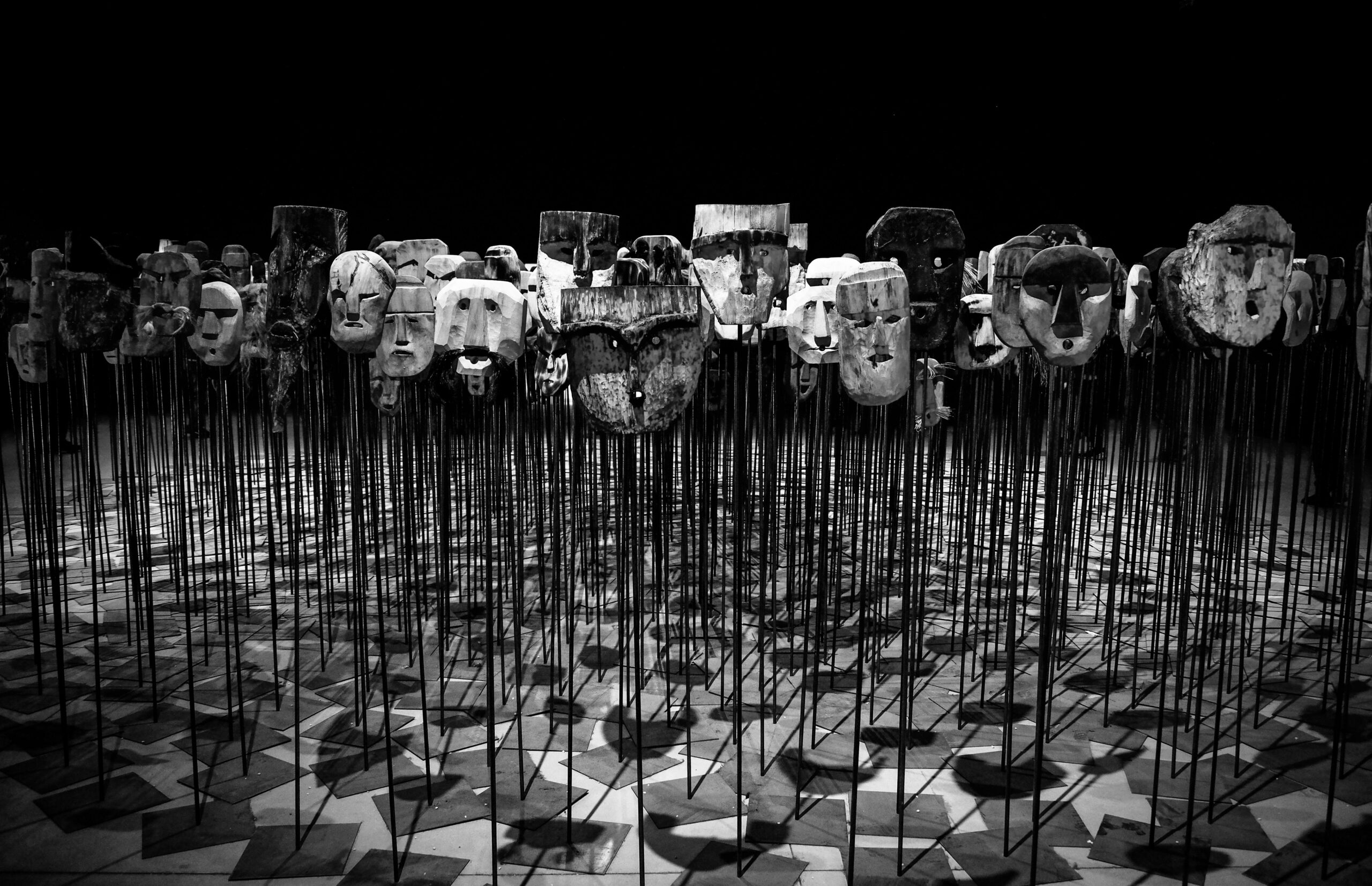
Location: The District Theatre
Date of interview: June 11, 2021
Interviewer: Sha-Nel Henderson
Actor interviewed: Jon Studdard as Chuck
Brief Summary (taken from social media): Interrogation was written about black men, for black men. So that they may be heard. Rav’n Partee dug into what lies beneath what they are expected or presumed to be. After interviewing a number of our men, Rav’n translated their sentiments to compose this piece. It was such an honor and she hopes to do y’all some . . . JUSTICE.
Description written by Sha-Nel Henderson: Interrogation explored the many perspectives of Black men in America. This production shed light on police brutality, homosexuality, father and son relationship and how their daily life experiences have shaped the way they navigate through the world. With poetry, anecdotes, and enthralling conversations, writer and director Rav’n Partee draws our attention to an important subject matter that has been neglected for too long.
Black Stage: What would you say you enjoyed most about participating in the production?
Studdard: Throughout the whole process, I would say Rav’n who was our director; was very interactive with us. Since it was her original work, she said we could add to it. Sometimes things don’t feel right to you, so a lot of our spoken word pieces you see in it (the production) talked about our personal struggles
Black Stage: Why is a production like this so important right now?
Studdard: I think, especially with 2020 being such a crazy odd year the fact that something that was written by a Black female and performed by Black artists is a huge deal! Just because Black people have so much to say, we are not always afforded the opportunity to say what it is we need to say.
Black Stage: When we are talking about the liberation of Black people, how would you characterize this production within that?
Studdard: I mean, it’s unity and I love that!
What Do You Think?
By Leah Humphrey
Under a warm and sunny sky, audience members recently were impressed with a play at the District Theatre entitled Interrogation written by a fresh young playwright, Rav’n Partee. The play is centered around the experiences and lives of four Black men as they try to navigate conflict, financial stability, love, and violence. After asking many attendees the question, “What do you think?” The response from the audience was positive and proved that the production touched on topics and characters that were close enough to reality that many audience members felt deeply connected to the storyline.
Juanita T. – “Very enlightening. I usually date women, so, me, watching this show gave me another perspective on the male mindset and the male perspective out here in this world. I’m glad I got to see and experience that. Especially for the Black man. A lot of people are not open to hearing their voice, and this is the time for them to get their voice and their emotions and their feelings out. And for them to get a perspective of that themselves on a personal level. Really dope, really dope.”
Jae- “ It gave a good perspective…different perspectives on what the Black man faces in everyday reality. It was good to, ya know, get that out there, in a way where people can understand and it’s not too heavy. “
Ivory- “ I thought it was exceptional… I still got goosebumps, because the story line that a lot of those young men told up there today, even the OG that was me. I do Simply Serenity now, it’s comedy shows, spoken word. I met the young lady that put this whole thing on, because she works at her day job. And she told me her vision about two or three weeks ago at my set, and I was like I’ll be there. And it was everything and beyond because now I want to be up on that stage next time and spit some spoken word.”
Me: Did anything stand out to you?
Ivory: “ I had the same issues with my son that the OG was talking about. That shit was real. You can be in the household, you can raise them up, you can give them a hundred and ten percent. They gotta see it for themselves. My son is 27 years old and we haven’t spoken in two years. So yea, that was real. That touched me. All of it. But that part right there.”

Past OnyxFest theatrical productions add colorful perspectives to this year’s IndyFringe!
By Vernon A. Williams
Life and death literally lie in the power of words. Whether written, spoken, performed in song or on stage, as the timeless idiom suggests, words remain far more potent than the sword; particularly given the plethora of actual and virtual platforms.
The style and authenticity of narratives from an unapologetic Africana perspectives honor legacy, define status, articulate challenges as well as opportunities, and devise a blueprint on which to build the foundation for unborn generation.
For optimum bodily function, sleep is essential. To get the most out of waking hours, knowledge is key. The Africana Repertory Theatre of IUPUI (A.R.T.I) is a source of awareness leveraging the creative and communal power of arts as a tool for fostering community, empowering youth, and creating positive social transformation. A.R.T.I. community outreach focuses on educational programs, arts-based research, university teaching and theatrical production.
In the height of resurging social consciousness spurred by, among others, the atrocious deaths of Trayvon Martin, Sandra Bland, Breonna Taylor, and George Floyd, social media and the performing arts became increasingly pertinent to strategy building and proactive direction. There was renewed emphasis on being “woke” – synonymous with being both informed and aware.
From inception, Black performing arts have countered misinformation and jaded perspectives of African American life and culture. The words performed on stage by actors often embody an Africana diaspora that is not merely entertaining and engaging but, more importantly, contribute positively to education, inspiration, affirmation and aspirations.
After 11 years, OnyxFest Indianapolis remains the state’s first and only theater festival exclusively for Black playwrights. Two plays that emerged from last year’s event – performed in the midst of a global pandemic – provide a riveting and timely theatrical experience.
One of those plays, “I Feed You Defiance” is the passionate portrayal of the dilemma facing women of color, who are heads of households, striving to prepare sons for a confrontational society. The other, “Being Black,” is a soulful mosaic of the life and culture of a people featuring expressive vignettes that tell myriad stories that exude unique and intricate realities of Black Americans.
After sold-out performances in 2020, both plays were invited to participate in IndyFringe – the largest theatrical festival in Central Indiana. CEO Justin Brady says that the popular stage extravaganza “exists to encourage support and assist independent artists by providing an accessible outlet that draws together diverse elements of the community and inspires creative experiences through the arts.”
Artistic diversity will take center stage.
Director Tijideen Rowley said his play, “Being Black,” is about capturing the everyday impact of systemic racism and how we respond to it from a position of strength and victors. “We want to show that the obstacles faced are real but celebrate our wisdom, strength, resourcefulness, values, resilience and perseverance in overcoming whatever we face; declaring without permission our national and global significance. This play is the joyful truth that the Black community is much more than a monolith, deeper than stereotypes and boundless in the reach of its possibilities.”
Playwright/Director Rain Wilson, “When you say art does not have to be about activism, I agree. But mine does. “I Feed You Defiance” is about mothers giving lessons to Black and Brown sons. We have to teach them how to disobey, oppose and defy a system that would otherwise be oppressive to them. Our voice is necessary, no matter how heavy the message, to draw people to the side of needed change. The voiceless must be heard, and be presented so that they land in the hearts and minds of those who can scream their needs loud, causing it to shake oppression loose at its roots.”
IndyFringe is held August 20 through September 5. Visit onyxfest.com or indyfringe.org for tickets to “I Feed You Defiance” and “Being Black.”

Anatomy of a Dream
Ophelia Wellington: Founder of Freetown Village
By Terrence Lambert
BlackStage: When was Freetown Village formed?
OW: 1982
BlackStage: What inspired you to start the organization?
OW: I just really started reading The Bible, history, and so forth and used my background as a teacher to come up with the concept that we use for first person interpretation and theatre programming.
OW: When I first started Freetown Village, all of our programs were in the year 1870 because that was five years after the Civil War, five years after the thirteenth amendment that emancipated the slaves. It was during the industrial revolution where the Black community was thriving and prospering. It was a fairly inspirational time for us in this country.
BlackStage: Can you describe the feeling of watching Freetown Village grow since 1982?
OW: There’s some good and some bad because I think Freetown Village is one of the greatest art forms, but everybody doesn’t agree with me. I’ve enjoyed explaining and enjoying Freetown from the one little file box that I had in a little room that was probably a 10×10 with two desks, two chairs, and one trash can and a big old black phone on the desk. And now I’ve got more than one file box.
There are people who have been involved with Freetown Village over the years. There are children who’ve seen one of our programs who now have children and can recall with great joy their experience with Freetown Village.
We use a lot of interaction with the audience. And when I first started Freetown, I went to the theatre professionals to ask them for their help in planning. Many of them told me, “Ophelia you can’t use the audience like that because you can never predict what the audience is going to do.” So, as a classroom teacher, I could never predict what my students were going to do, but I knew I was in charge and the one in control.
The first shows we did were based on their professional recommendations, and I hated those shows. I couldn’t wait for them to be over. After that I said, “thank you for your professional help, but I’ll take it from here” and I started using what made the most sense to me. History is not that exciting to everybody, but if you personalize it you make people feel the passion, the heart, the story, the triumph of that individual. If you pepper that with things people can relate to, people understand. They get it. We have so many stories of people who’ve said “I never knew that “ and “I’m so glad you talked about that” or “I learned a lot.” They have that memory because they related to the character. People relate to people.
BlackStage: What kind of impact has Freetown Village had on the African American community in Indiana?
OW: Almost every single one of our performers will talk about how they learned things from Freetown Village and how much their life was changed. Many talk about how they’ve never learned about this in school. Most of us don’t learn this in school but that doesn’t prevent us from learning. We’ve got books, we’ve got the internet, and we have resources. So we have to take the time and learn it. People can’t leave it all to teachers because it’s not gonna get done.
BlackStage: Why is performance important in telling the stories of African Americans ?
OW: Seeing is believing. And acting is believing. So if I wanted to tell you about African American history and culture in Indiana, I can do the research, prepare a paper and give it to you. Sit down and read it. Or I can give a lecture and talk about what I discovered. Or I could show you history. And if I show you you’re more likely to relate to it. You’re connecting the senses. It’s more than auditory, it’s more than the visual. You’re connecting all the other senses with it too. It’s the engagement.
BlackStage: As founder, what has been the most rewarding experience throughout the nearly 40 years of Freetown Village?
OW: The feedback. What people say they’ve learned or appreciate about Freetown Village. Sometimes I’ve been to places where people are talking about Freetown and I think “What, that sounds pretty good!”
BlackStage: If you could invent Freetown Village again, is there anything you would do differently? What? Why?
OW: I would start out with a greater long range plan. With the knowledge I have now I am more strategic with what I am doing and what I have. We’ve traveled to 80 of our 92 Indiana counties and even know there’s a great opportunity to travel more because of different Diversity, Equity, and Inclusion initiatives.
BlackStage: For people who’ve never been to a Freetown Village performance, what do you hope they gain?
OW: As an educator I’m always looking to see what people are learning. We’ve had a lot of fun over the years. We have kids now who have kids that went through our summer camp and talk about the things they have done and how Freetown has changed their life. It’s almost like an out of body experience. When people talk about Freetown I have to realize OK, this is the program I started, but it’s really good to hear what people say.

